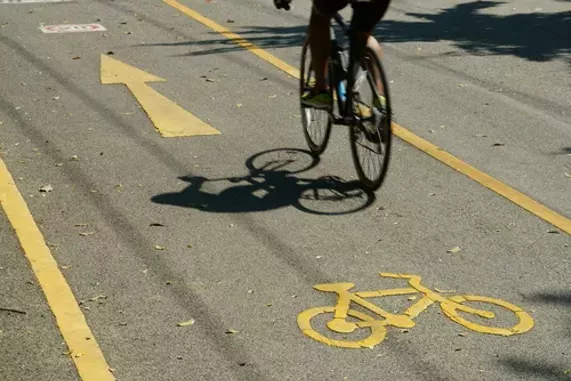
Photo courtesy Shutterstock
Good old Keith Crain: On a slow news day, he can still issue an opinion piece so full of obsolete prejudices and scenery-chewing, he sounds like Nolan Finley crossed with Monty Burns. The topic of his most recent editorial? Detroit’s bike lanes, and how, along some major thoroughfares, protected cycling lanes have appeared.
Normally, it's the sort of thing that would inspire a reporter to pick up a telephone, find the responsible parties, and ask all sorts of questions, then process the information and present these explanations to the publication’s readership.
Not Keith Crain.
He admits right up front that he has no idea who conceived of the plan, what exactly it entails, guesses nobody has seen it, and then proceeds to tear apart what he supposes it to actually be.
What follows is a wheezy jeremiad containing careless second-hand assertions, faulty contentions, childish conjecture, and shameless hyperbole, with a chewy center of willful ignorance. In fact, it’s remarkable that one writer was able to pack such uninformed writing and so many logical fallacies into one 422-word “story.”
Crain is no stranger to overstatement; this year he called those objecting to the Grand Prix closing down much of Belle Isle for roughly nine weeks “a handful of dissidents would like to see this event canceled so that they can use that part of the island for the few days.” In this weekend’s piece, he offers his readers a sacrificial straw man of his own creation, a secret “master plan” to “convert Detroit into a bicycle paradise,” by “converting our city streets into bicycle lanes all over the city.” (Even if city streets were, as Crain implies, completely taken away from motor vehicles, you’d think in a city designed for a car-centered population four times its size, there’d be an acceptable “alternate route.”)
In fact, this idea that the addition of bike lanes protected from motor vehicles by bollards (Crain calls them “poles”) constitutes “discriminating against cars” is laughable when viewed in the full context of the last century. It was American urban planning policy that took the private vehicle and gave it an unrealistically sacrosanct place in our society. We’re going to go way out on a limb here and guess that Keith Crain hasn’t perused Jane Holtz Kay’s Asphalt Nation or the collected writings of Lewis Mumford.
The road, roughly a century ago, belonged to all of us — pedestrians, streetcars, animals, children, and, yes, even the exhaust-spewing flivvers of that day — for business, work, or even play. Starting in the 1910s, it was public policy and law that elevated the car to king of the road. As a country, we started shooing pedestrians and bicyclists onto the sidewalk, enacting jaywalking laws, and finally creating massive expressways where only motor vehicles were allowed.
Today, the car’s supremacy is more or less complete. In Michigan, is there any street outside of Mackinac Island where you can’t drive on every single road? Is there any building, save for a few fortress-like government offices, where you can’t drive right up to the curb at the front door? Even the business owner who lives above his shop may be required by law, at significant expense, to provide parking for customers.
And since Keith Crain sounded a mournful note that such bike lanes may not be used as widely in challenging weather, when it comes to flagrant excess and wasted resources, the cyclist has nothing on the motorist. Your typical motorist tooling down Jefferson on the way to work is piloting a vehicle weighing about 3,000 or 4,000 pounds that is 80 percent empty. And when it arrives downtown it will sit empty and unused for at least eight hours, during which time it may be lavished with cooling shade, 24-hour lights, vigilant security, and often its very own building.
In truth, there is no secret plan to banish the automobile from the Motor City. Crain guesses he must have been “out of town” when bicycle-friendly decisions were made. More to the point might be “out of touch.” The movement to make Detroit more friendly to bicycles has been conducted openly in the city, from the efforts of Detroit Greenways to the rentable MoGo stations now placed around town to the Complete Streets policies implemented in Lansing almost eight years ago.
Given his spot at the top of a media and business empire, you’d think Keith Crain might have seen the many business studies showing that younger people simply don’t regard cars as important to them. He might also have read articles in national newspapers and magazines describing how many now regret the excesses that accompanied granting the automobile primacy, especially in the city. He may have noticed that cities around the world are taxing, curbing, balking, and even banning cars from their downtowns.
Amazingly, none of this registers for Crain. In fact, he’s so anti-cyclist he even seems at odds with your run-of-the-mill pro-business Detroiter. Freep business reporter John Gallagher might have been speaking to Keith Crain when he counseled those who “will have to let go of some of their anger at anyone — bicyclists, pedestrians, disabled people in motorized scooters — taking up some of the public street they once had to themselves.”
With columns like this, Keith Crain may be able to wring a last few chuckles from his dwindling audience of angry old businessmen, but he clearly alienated many Crain's readers. One commenter summed up the response of many readers when by writing simply, “Keith Crain is just another of those miserable, blinkered, backward-thinking old farts who, thankfully, are a dying breed and who have less and less influence on society as time goes on.”
Stay on top of Detroit news and views. Sign up for our weekly issue newsletter delivered each Wednesday.

